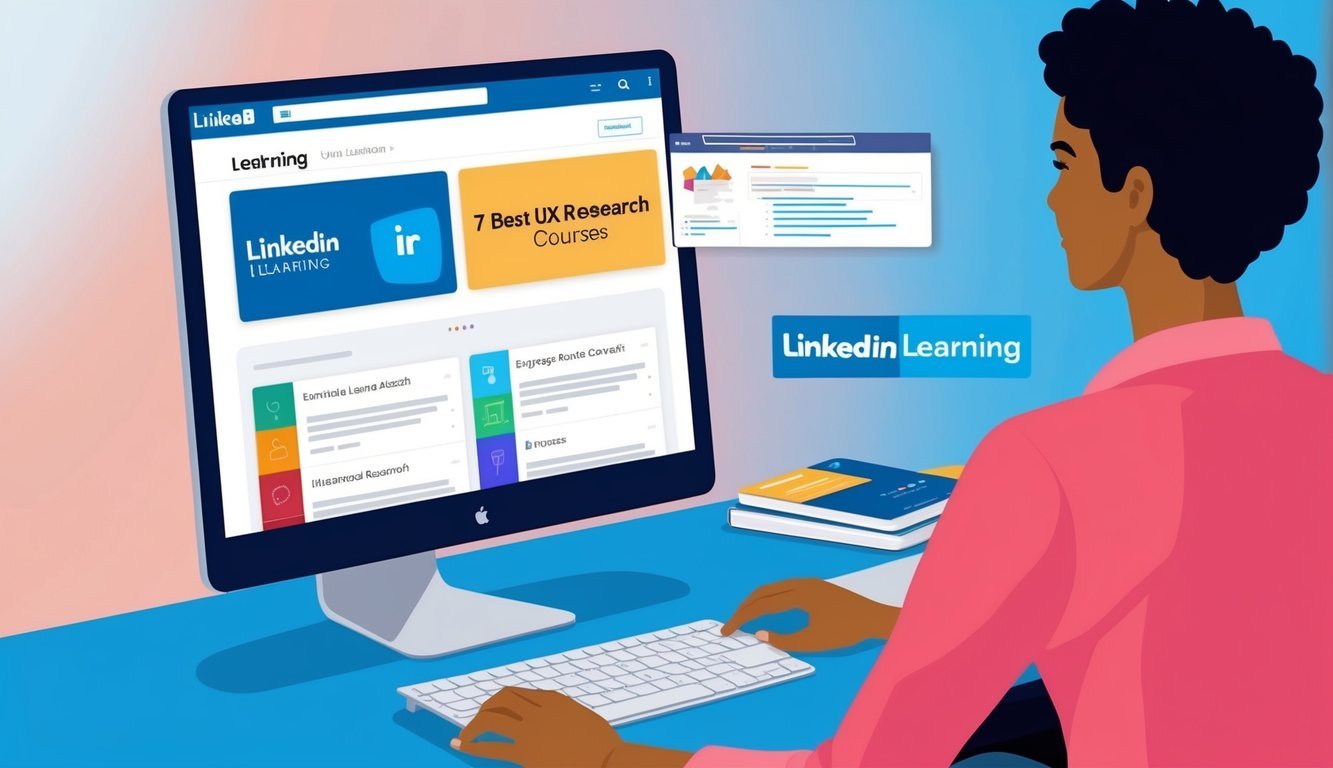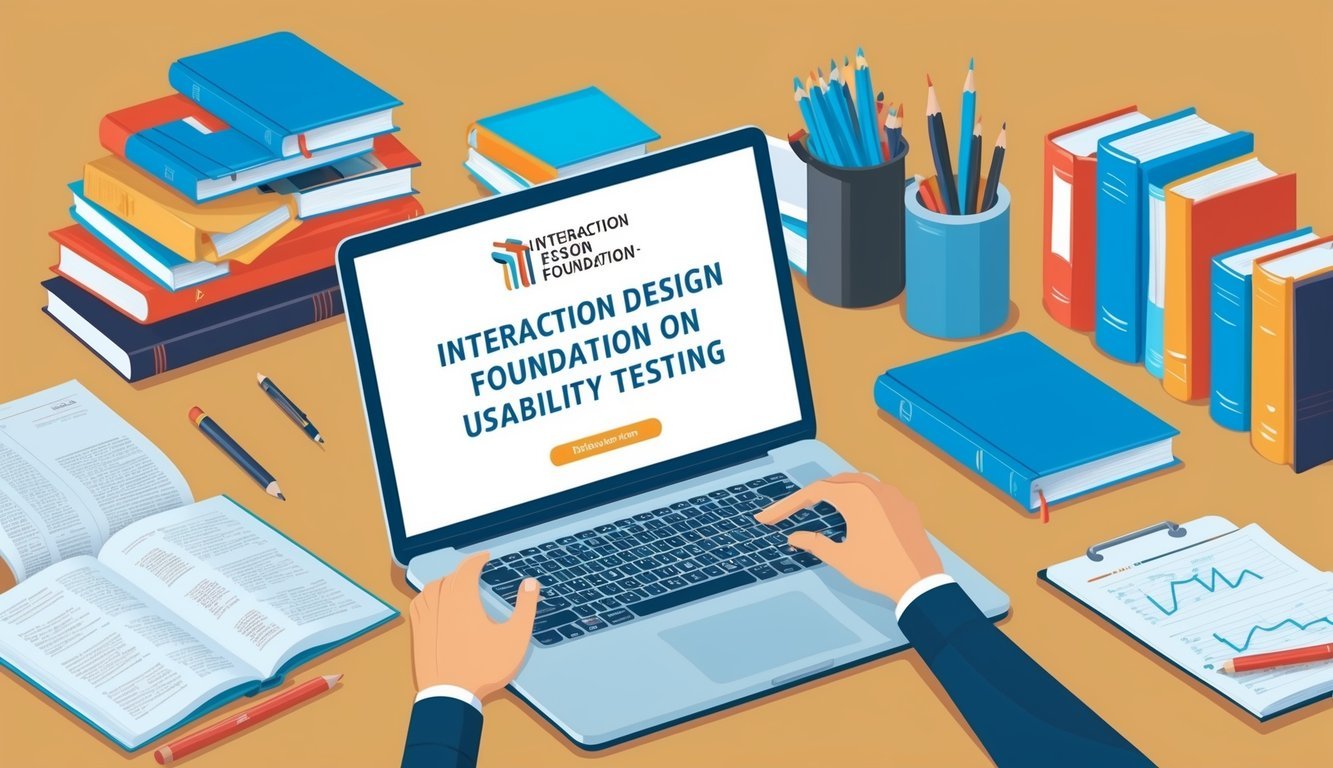“`xml
Looking to level up your UX research skills? You’re in for a treat! The field of user experience is always evolving, and keeping pace with the latest techniques is crucial.
Enrolling in a solid UX research course can equip you with the tools you need to thrive in this expanding realm.
alt=”A table with a laptop, notebook, and pen, depicting a user testing session featuring various UX research materials and tools scattered around”>
UX research courses can guide you in gathering user insights, analyzing data, and ultimately designing better products. Whether you’re just starting or you’re a seasoned pro looking to sharpen your abilities, there’s a course tailored for you.
We’ve compiled a list of top-notch options to help elevate your UX research game.
1) Introduction to UX Research and Design by Coursera

Curious about UX? The Introduction to User Experience Principles and Processes course on Coursera is a fantastic starting point.
This course is part of the User Experience Research and Design Specialization offered by the University of Michigan.
If you’re new to the game, this is ideal for getting a feel for the basics.
You’ll go through six modules, covering user interviews, system evaluations, and some great design principles.
Don’t fret if you’re not a tech whiz; it’s designed for beginners, using straightforward language.
Plus, you’ll get hands-on with projects from concept to user research and design tweaking.
By the time you finish, you’ll have a solid foundation that’s useful whether you plan to dive deeper into UX or apply these skills in your current role.
2) User Experience Research Methodologies by edX
Want to absorb UX research wisdom from renowned universities? Check out edX’s course on User Experience Research Methodologies.
This online program is all about connecting with users at every stage of a digital product’s life.
You’ll develop empathy and uncover insights that make designs more effective.
The course covers essential tools and methods for UX research.
You’ll learn how to gather user feedback and apply it to create superior products.
Flexibility is key here—edX lets you learn at your own pace, making it easy to fit lessons into your schedule.
By the end of the course, you’ll possess practical skills vital for conducting effective UX research.
Perfect for newbies and anyone eager to enhance their knowledge!
3) Google UX Design Professional Certificate
Interested in learning UX design from Google experts? The UX Design Professional Certificate on Coursera is just what you need.
It’s a solid pick for beginners or those ready for a career shift.
The program walks you through all the essentials.
You’ll dive into user research, wireframing, and prototyping, plus get hands-on with tools like Figma.
No experience? No worries! This course is super friendly for beginners.
You can work at your own pace and realistically finish it in about six months with a commitment of around 10 hours a week.
And hey, you also get access to Google AI Essentials for free! That’s a nifty way to keep up with the latest tech trends.
By the end, you’ll have a professional UX portfolio to flaunt to potential employers.
This certificate might even open doors to interviews with top companies like Google.
Ready to kickstart your UX career? This course is a smart investment!
4) Nielsen Norman Group’s UX Certification Program
Want to learn from the UX giants? Check out the UX Certification Program from the Nielsen Norman Group.
They’re known for their high-quality research and user experience training.
This program offers flexibility, letting you choose from a range of different courses to suit your needs—whether you’re focusing on basic concepts or diving into advanced topics.
You can also specialize in areas like Interaction Design, Research, and Management.
This is particularly handy if you want to hone in on a specific aspect of UX.
All courses are online, so you can learn when it suits you.
You’ll be taught by industry experts who have been honing their skills for over 25 years!
Just a heads up, this certification isn’t officially accredited.
But don’t let that discourage you—lots of big names trust Nielsen Norman Group as their go-to for UX training.
5) Human-Computer Interaction for User Experience Design by Pluralsight

Eager to dive into UX design? Check out Pluralsight’s User Experience Design Fundamentals course.
It’s a terrific starting point for anyone keen to learn the basics of UX.
This course covers the core concepts of UX and shows how it fits into software development, all while you learn important terminologies.
You’ll explore the entire UX process—from research and information architecture to visual design.
It’s a thorough journey that sets a solid groundwork for your UX education.
But wait, there’s more! Pluralsight also has a full User Experience Design learning path for those wanting to dig deeper into UX principles and practices.
You’ll get insights into user psychology and discover how to anticipate user needs.
The curriculum aims to help you craft seamless and engaging interactions.
By the time you finish these courses, you’ll be ready to design user-friendly interfaces.
You’ll start thinking like a UX designer, creating products people truly enjoy using.
6) UX Research by LinkedIn Learning

Looking to sharpen those UX research skills? LinkedIn Learning has got your back.
Their UX Foundations: Research course is a nifty place to start.
This course dives into practical techniques that can enhance your UX research—great for fast-paced projects.
You’ll explore various research methods and learn when to apply each one.
LinkedIn Learning also features a broader UX researcher learning path to help you level up your skills with multiple courses.
What’s cool about LinkedIn Learning is its flexibility—you can access courses whenever and wherever works for you.
This makes it easy to fit learning around your busy life.
And hey, they also provide a certificate upon course completion, a great addition to your LinkedIn profile or resume!
7) Interaction Design Foundation’s The Practical Guide to Usability Testing

Want to get into usability testing? Give The Practical Guide to Usability Testing from the Interaction Design Foundation a shot.
This course teaches you how to plan and conduct usability tests, helping you identify design issues and providing tips for improvement.
You’ll learn about different testing methods, practice with real-world examples, and receive feedback on your work.
By the end, you’ll be equipped to create user-friendly designs that people can easily navigate.
This course works for both beginners and more experienced designers.
It’s all online, so you can learn at your pace.
And when you wrap up, you’ll earn a certificate to highlight your newfound skills.
The Interaction Design Foundation is a reputable source for quality UX courses, offering a wealth of other UX design courses to broaden your expertise.
Importance of UX Research

Let’s face it: UX research is crucial for crafting products that users genuinely appreciate.
It’s all about understanding your audience and improving design.
So why does this matter?
Understanding User Needs
UX research is your ticket to getting into the minds of users.
You’ll uncover what they truly desire and need, which is vital for creating products people actually want to use.
Surveys and interviews give you direct insight from users, allowing you to grasp their challenges and aspirations.
This info is gold when it comes to design.
And watching users interact with your product? That’s like being a detective unveiling hidden issues you didn’t know existed.
With well-conducted research, there’s no more guesswork.
You get solid data that backs up your design choices, making your chances of success much higher.
Improving Product Design
Great research can lead to outstanding designs.
It helps you zero in on what truly matters to users.
Testing different design ideas before jumping into development is a smart move.
It saves time and money by making it easier to address issues upfront.
Research also helps you prioritize features according to user preferences.
This way, you won’t spend time on things nobody cares about.
Plus, presenting data-backed research can sway stakeholders—it’s tough to argue against actual user feedback.
Remember, design isn’t just about aesthetics.
It’s about solving real problems for real people, and UX research is your guide to figuring those issues out.
Key Skills for UX Researchers

To excel as a UX researcher, you need a blend of technical skills and people skills.
Two critical abilities are conducting usability testing and slicing through heaps of information.
Usability Testing
Usability testing revolves around observing how everyday folks use your product.
You’ll set up tests, watch users in action, and take notes on what works and what doesn’t. It’s essential to ask the right questions without leading users down the wrong path.
Here are some tips for effective usability testing:
- Keep test scenarios relatable.
- Encourage users to voice their thoughts as they navigate.
- Watch out for body language and facial cues—those can reveal a lot.
If you want to sharpen your usability testing skills, check out Pluralsight’s UX Research course.
Practice makes perfect in this arena, so take a shot at testing products you encounter daily.
Data Analysis
Once you’ve gathered that wealth of user data, it’s time to roll up your sleeves and analyze it.
Data analysis isn’t just number crunching; it’s about hunting for patterns in what users say and do.
Here are some key data analysis skills to nail down:
- Coding qualitative data (like interview responses).
- Building user personas.
- Spotting trends among various user groups.
Tools like spreadsheets and data visualization software are helpful, but your brain is your sharpest tool.
Connecting the dots between different data points is where the magic happens.
The UX Design Institute’s User Research course dives into data analysis techniques.
Your goal is to transform findings into design-driven actions.
Frequently Asked Questions

UX research courses come in all shapes and sizes, from free to paid options.
Here’s a rundown of answers to some common questions to help you find the right course for your needs and skill level.
What are the top user experience research courses to take online?
The Google UX Design Professional Certificate is a standout for comprehensive learning, covering effective research methods and practical skills.
Meanwhile, Coursera’s Introduction to UX Research and Design is perfect for beginners who want to grasp essential concepts in user research.
Can you recommend good UX research courses that are free of charge?
Absolutely! You might want to consider the User Experience Research Methodologies course on edX.
It’s free to audit and covers key research techniques.
Also, some platforms offer free trials.
You could look into Pluralsight’s Human-Computer Interaction for User Experience Design during their trial period.
As a beginner, what UX research courses should I start with?
Certainly! The Google UX Design Professional Certificate is beginner-friendly and packed with valuable content.
It starts with the basics and gradually introduces more complex topics.
Similarly, consider Coursera’s Introduction to UX Research and Design for a foundational learning experience in UX research.
Which online platforms offer the best UX research courses?
Coursera and edX are top choices for many learners.
They partner with prestigious universities and organizations to provide high-quality content.
On the flip side, Pluralsight is fantastic if you want to focus on tech-driven UX research learning, with courses like Human-Computer Interaction for User Experience Design.
How can I become a skilled UX researcher without spending money?
Start by auditing free courses on platforms like edX and Coursera.
You often get access to video lectures and readings at no cost.
Practice is essential! Conduct user interviews with friends or family members.
Analyze apps or websites you use regularly to build your research prowess.
What do Redditors say about the most effective UX research courses?
Many Redditors rave about the Google UX Design Professional Certificate for its practical approach and how well-recognized it is in the industry.
The Nielsen Norman Group’s UX Certification Program is also highly praised for its comprehensive content and respected certification.
“`
This rewrite maintains the key information while providing a warm and engaging tone.

